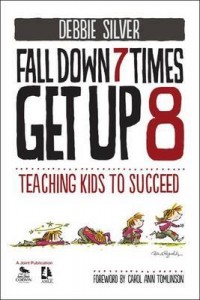Teaching Kids to Succeed
Fall Down 7 Times, Get Up 8: Teaching Kids to Succeed
by Debbie Silver
(Corwin Press, 2011 – Learn more)
“Do you believe students today are less motivated than students in the past? Explain why or why not.” This was author Debbie Silver’s opening question as AMLE’s MiddleTalk listserv group discussed her book, Fall Down 7 Times, Get Up 8: Teaching Kids to Succeed, and it triggered a memorable chat.
I’ll just say it upfront: I love this book. It was a pleasure to read, and after I finished it, I felt obligated to share it with anyone I could. I took it with me to meetings, conferences, and informal gatherings. I read passages of it aloud to friends and family. I posted a picture of it on my Facebook page, complete with my color-coded post it flags.
I often think about what I learned from this book as I choose my words in speaking with students (or my own children). Fall Down is an ideal blend of theory, common sense, research and humor as it deals with finding effective ways to help students scaffold success.
Interaction and feedback
In my years of teaching in numerous schools, I’ve grown somewhat weary of various systems (often very time-consuming and expensive) designed to motivate students, often with wide-ranging use of extrinsic rewards. Silver’s book focuses on human interactions rather than “things,” and effective feedback rather than effusive praise.
Here’s one of my favorite passages from the book. It’s Debbie’s “wake up!” question:
We have given trophies to players who just show up, and we told our children they are the best when clearly they are not. We have led them to believe they have a right to be comfortable, to be untroubled, and to be constantly entertained. In an effort to ensure they feel good about themselves, we applaud, we excuse, we rationalize, and, when needed, we intervene on their behalf. And I ask this question, “How has that worked out so far?”
Fall Down 7 Times, Get up 8 is efficiently arranged into chapters dealing with such things as self-motivation, attribution theory, mindset, autonomy, failure, and rewards. I really appreciated the way Silver integrates so much research into the book, including Vygotsky, Bandura, Dweck, Tomlinson, Kohn, Marzano, Goleman and Csikszentmihalyi. Rather than simply reciting their conclusions, she effortlessly interweaves their findings into easily-understood scenarios.
 The book’s chapters include classroom situations (more realistic than in many books), strategies, conversations, and specific ways to model what she is proposing. Each chapter ends with a conclusion offering a concise yet thorough summary. The final chapter has FAQ’s, which included many of the exact things I was still wondering about, or things educators or parents might ask. As Silver explains, “I want to assure you that I did not initially embrace some of the concepts I present in this book, nor did I accept all of them with equal ease. These are the best practices I know for now.”
The book’s chapters include classroom situations (more realistic than in many books), strategies, conversations, and specific ways to model what she is proposing. Each chapter ends with a conclusion offering a concise yet thorough summary. The final chapter has FAQ’s, which included many of the exact things I was still wondering about, or things educators or parents might ask. As Silver explains, “I want to assure you that I did not initially embrace some of the concepts I present in this book, nor did I accept all of them with equal ease. These are the best practices I know for now.”
Silver’s take on student motivation
So, how does Debbie Silver propose we help students become independent, successful learners? If children struggle a bit on the way to success, they will be more motivated to continue, because they will realize a feeling of achievement; if things come too easily, where is the sense of accomplishment?
If we tell students they will do fine because they are “smart,” “talented” or “bright” and they later fail at something, they often think that maybe they’re not so great anymore. It is more important to specifically praise an effort, not the result. As Silver summarizes, most writer/researchers “hold a common belief that the most powerful motivational reinforcer is for students to experience earned success.”
The chapter on self-motivation has a spot-on series of statements that demonstrate the difference between empowering and entitling children, while the chapter on attribution theory has examples of effective and ineffective praise. Carol Dweck’s research on “mindset” is highlighted in the next chapter, with many applications that include G/T and struggling students. “What Do I Get for It?” details Silver’s own experience with realizing that the use of rewards can be manipulative and controlling, yet she also gives examples of instances where rewards can be affirming (largely when they are unexpected and after a task is complete.)
Debbie Silver up close
 I am frequently jealous of fellow educators and speakers who name-drop titles of recent books they’ve read. It seems like I can barely keep up with my workload, let alone complete outside reading. But when the MiddleTalk listserv (a member benefit of the Association for Middle Level Education) offered a chance to have an asychronous chat about the book this summer, complete with Debbie Silver herself, I decided I could find the time. What followed was a lively online conversation that could easily be duplicated within a school (with or without Debbie).
I am frequently jealous of fellow educators and speakers who name-drop titles of recent books they’ve read. It seems like I can barely keep up with my workload, let alone complete outside reading. But when the MiddleTalk listserv (a member benefit of the Association for Middle Level Education) offered a chance to have an asychronous chat about the book this summer, complete with Debbie Silver herself, I decided I could find the time. What followed was a lively online conversation that could easily be duplicated within a school (with or without Debbie).
Last fall I attended the Kappa Delta Pi Centennial Convocation in Indianapolis, where I heard Silver deliver a fabulous keynote. I don’t know how I’d managed to attend various conferences in my 30-plus years in education without seeing her before. KDPi’s attendees were chiefly pre-service teachers, and I thought to myself, “Wow, what a perfect speaker to inspire future educators. They’re starting at the top.”
This book would be ideal for a teacher discussion group, parents, or text for pre-service teachers. It also includes a detailed glossary of theories, research and vocabulary, as well as discussion questions. I “Highley” recommend it.
Susie Highley is a library media specialist for several schools in Indianapolis and former science teacher. She is one of the co-authors of Teaching 2030: What We Must Do for Our Students and Our Public Schools–Now and in the Future and member of the Teacher Leaders Network. She has a passion for almost everything connected with middle schools, and serves on the board of the Indiana Middle Level Educators Association (IMLEA). She occasionally has to put herself on twitter “diets,” as her PLN shares so much valuable information, she can’t get anything else done. (You can follow her at @shighley)



































1 Response
[…] Fall Down 7 Times, Get up 8: Teaching Kids to Succeed by Debbie Silver. I am so tired of all of the time and effort some educators put into devising elaborate reward systems, which, in my opinion, do little to change behaviors. I reviewed this book for Middle Web. Debbie does a great job of combining current research and practicies in an entertaining manner, filled with many examples. Here’s a link to my review. […]